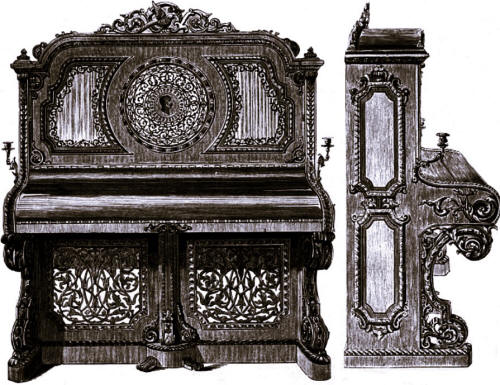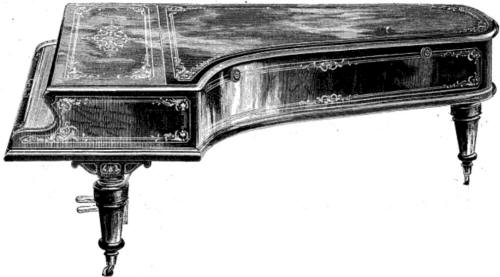home
| Pianoforte-makers
in England
in London
|
Ob sie dies mehr ihrer soliden Construction und Klangfarbe, oder ihrer äussern Ausstattung zu danken haben, wagen wir hier nicht zu entscheiden, indessen haben wir es nur mit der letztern zu thun, und dürfen in dieser Hinsicht zugeben, dass bei diesen zierlichen Instrumenten allerdings das Mögliche geleistet ist, um auch das Cabinet-Pianofortes wie dieselben ausdrücklich genannt werden der renommirten Firma." Illustrirter Katalog der Londoner Industrie-Ausstellung von 1862, Volumes 1-2, 1862, p. 82
In der Ausstellung ist dieser Zweig der britischen Kunstindustrie sehr
zahlreich und würdig vertreten in einer Menge von Grand, Boudoir-Grand
und Cottage-Pianofortes, d. h. von Flügeln, Tafelklavieren und Pianinos.
Eine sehr vollständige Sammlung dieser verschiedenen Instrumente stellen
aus J. AND J. HOPKINSON von Regent Street und Conduit Street, LONDON.
Wir bilden daraus ab einen wunderschönen Concertflügel, das Gehäuse von
polirtem Nussbaum, eingelegt mit Elfenbein, Tulpenbaum und andern
kostbaren Hölzern.
Die ganze Ornamentation ist höchst geschmackvoll uns sauber ausgeführt,
wie denn überhaupt dieser Flügel schon durch sein Aeusseres sich zur
Zierde eines jeden Salons eignen wird. Was seinen Werth als
musikalisches Instrument anbelangt, so müssen wir uns hier damit
begnügen, hervorzuheben, dass die Manufactur langst wohlrenommirt ist
durch die Combination von klarem, vollem und doch delicatem Ton, mit
Kraft und Mächtigkeit, und dass sie bisjetzt bei allen Ausstellungen,
die sie beschickte, Ehren davongetragen hat."
Illustrirter Katalog der Londoner Industrie-Ausstellung von 1862,
Volumes 1-2, 1862, p. 174
The first engraving
is of a cottage grand, with carvings in the Italian style; and the second
shows a patent concert grand with all improvements. This is inclosed in a
case- of admirable workmanship walnut, inlaid with ivory,
tulip, box, and king woods, exquisitely carved. But it
is not to their cases that pianos owe their chief excellence.
Without
tho interior mechanism be of the liret oUfig, all the decoration in the
world would render them but boxes of worthless discord. In the pianos of
Messrs. Hopkinson — who has not heard them at the Exhibition discoursing
"most excellent music," under the guidance of highly-educated fingers ?
— the outside ornament forms but the least part of their value.
True,
they are fine pieces of furniture; but they possess a far higher value,
for they are famous musical instruments. To hear them well played is a
treat for a professor, much less a mere musical amateur like the writer.
In tone, touch, and all the requisites of first-rate pianos, they are
perfect — fitted alike for the concert-room or the cottage parlour —
brilliant, full, and at the same time delicate, and calculated in every
respect to sustain the high reputation their makers have so long had
with the musical world.
The valuable improvements in the manufacture of
pianofortes lately introduced have all been taken advantage of by the
Messrs. Hopkinson, the resources of whose establishment enable them to
compete, not only in excellence, but also in economy of production, with
the best makers in the trade.
To go to the Exhibition on a Saturday, and
to hear a fantasia on one of these instruments, is a treat indeed; and
when we come to consider what a complicated piece of work is the
interior of a piano — the strings stretched to a tension equal to a
pressure of several tons, and yet one faulty wire putting the whole
machine out of order — when we think what ingenious appliances arc
necessary before these strings can answer to the light touch of a
woman's finger — when we see that all the ends for which such an
instrument are fully answered, and we find the English piano a
highly-finished and complete box of harmony, our wonder and admiration
may well be excited.
To say that these instruments are as perfect as
they can be made, is to say all that can be said of any piano yet
manufactured: to compare them with the instruments of other eminent
makers is simply futile. Among the best there can be no better."
Cassell's Illustrated Exhibitor: Containing about
Three Hundred, 1862, p. 208-209
2. A similar grand, but in plainer case. This contrivance is so arranged as to allow a frame to descend over the strings, and to drop a light knife-edge of felt exactly in the middle of their length, by which, when the hammer strikes, the tone of the harmonic octave is produced, instead of the fundamental note of the string. The effect is pleasing, and the arrangement so ingenious as to justify favourable notice; but it is necessarily expensive, and must be of doubtful general utility.
5. An upright in elegantly carved case.
8. One of the first necessities for obtaining an evenly toned piano, seems to be that the frame-work shall be of such construction and strength that the various degrees of the strings tensions shall not unequally affect it. Perhaps the next necessity is that there shall be a firmness at the point whence the vibrating portion of the string starts. To obtain this, makers fit the brass studs over which the strings pass on to the iron frame-work. This operation requires much care, and makers —particularly German and American makers — are liable to permit the strings to be too closely connected with the unyielding and comparatively non-communicative iron framing. Hence the tone of the strings becomes hard and metallic. Some may consider such tone a desideratum. In Messrs. Hopkinson's iron bijou grand the higher notes have rather a uality of tone similar to that above referred to Messrs. Hopkinson show other instruments; one, an upright piano, made for tropical climates. The weight of this instrument is inconvenient, and the price (200 guineas) unnecessarily made high by ornament, which is called the style of Louis XVI. The framework seems well adapted to insure an inappreciable affection by rapid variations of temperature. The bijou pianoforte, £25, by. Messrs. Hopkinson, is fitted with an unchecked action, and the hammers are apt to rattle. The tone of this instrument is somewhat weak and uneven." Journal of the Royal Society of Arts, 1872, p. 890-891
HOPKINSON
Click on the links here above
For references see page
|




